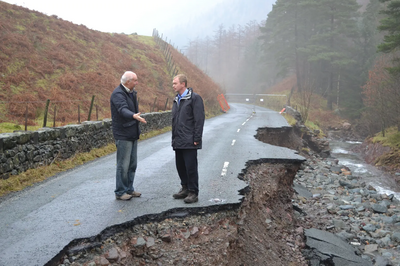Increased risk of flash floods shows need to fast-track flood defence plans

A new study by the Met Office warning of an increased risk of flash flooding shows that plans for flood defences in the South Lakes need to be fast-tracked, according to local MP Tim Farron.
The new study by the Met Office, taking into account the effects of climate change, warns that there is an increased risk of "unprecedented" winter downpours which can lead to severe flooding.
Their study suggests there's now a one in three chance of monthly rainfall records being broken in England and Wales in winter. Their analysis also showed a high risk of record-breaking rainfall in England and Wales in the coming decade.
Following a successful campaign by Tim, the government earmarked £24million for flood defences and flood mitigation schemes across South Lakeland. The Environment Agency is currently drawing up specific plans for these projects, but it is likely to be years before the work is complete.
Tim said: "This study won't come as a surprise to those local people who experienced the devastating floods of 2015. Homes, businesses and roads were destroyed across our area, and some local residents are still feeling the impact now.
"This study must not just sit on ministers' desks while people's homes remain at risk. It is far more than just a matter of niche academic interest - this study must serve as a warning and must be acted upon.
"The government must fast-track the flood defence schemes planned for the South Lakes, so that local residents can sleep easy at night without fear of disaster each time there's a downpour."
